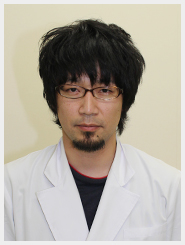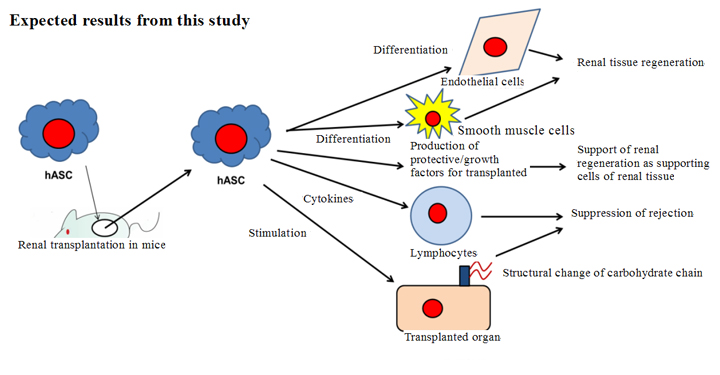




Tenure-track faculties:Yuki Tobisawa
 |
■Name Yuki Tobisawa ■Resume 【March, 2005】 BSC at University of Shizuoka 【March, 2007】 MSC at University of Shizuoka Grad. Sch. Of Pharm. 【March, 2010】 Ph.D. (Pharmacy) at University of Shizuoka Grad. Sch. Of Pharm. 【April 2010-June 2011】 Postdoctral Fellow, Sanford-Burnham Medical Research Institute, Tumor Microenvironment group (CA, U.S.A) 【July 2011-March 2012】 Postdoctral Associate, Department of Advanced Transplantation & Regenerative Medicine, Hirosaki University Grad. Sch. Of Med. 【Since April 2012】 Assistant Professor, Hirosaki University Graduate School of Medicine (Tenure-track faculty) |
■Research field
Glycobiology, Transplantation, Oncology
■Research theme
Analysis of tissue regeneration using adipose-derived-stem cells and the control mechanism of transplantation immunity
■Research summary
Regenerative medicine has currently attracted attention owing to the development of induced pluripotent stem (iPS) cells. Adipose-derived-stem cells (ASC), which we have used in research, are mesenchymal stem cells and are known to have the capacity to differentiate into smooth muscle and vascular endothelium. Thus its application to regenerative medicine has been expected. Adipose-derived stem cells can be collected in large amounts from one’s own subcutaneous fat and are considered to be a useful tool because of the absence of immunological incompatibility.
Currently in Japan, the number of patients on dialysis tends to increase every year, and renal transplantation has become more frequent. However, there is a chronic shortage in the availability of donor organs because of blood group and HLA class incompatibility. Therefore, we are conducting research and focusing attention on the usefulness of adipose-derived stem cells in the functional recovery of renal tissue and immunological control on renal transplantation.


<Before assuming the present position>
◎Original papers・Tobisawa Y, Maruyama T, Tanikawa T, Nakanishi K, Kurohane K, Imai Y. Establishment of Recombinant Hybrid-IgG/IgA Immunoglobulin Specific for Shiga Toxin. Scand J Immunol. (2011) 74:574-84
・Tobisawa Y, Imai Y, Fukuda M, Kawashima H. Sulfation of colonic mucins by N-acetylglucosamine- 6-O-sulfotransferase-2 and its protective function in experimental colitis in mice. J Biol Chem. (2010) 285:6750-60
・Kawashima H, Hirakawa J, Tobisawa Y, Fukuda M, Saga Y. Conditional gene targeting in mouse high endothelial venules. J Immunol. (2009) 182:5461-8
・Maruyama T, Iizuka H, Tobisawa Y, Shiba T, Matsuda T, Kurohane K, Imai Y. Influence of local treatments with capsaicin or allyl isothiocyanate in the sensitization phase of a fluorescein-isothiocyanate-induced contact sensitivity model. Int Arch Allergy Immunol. (2007) 143:144-54
<2012>
◎Current status of research progression
To investigate the utility of adipose-derived stem cells, a type of mesenchymal stem cell, for application in transplantation and regeneration, we conducted research on the cytokines that are expressed by adipose-derived stem cells. Our research confirmed that adipose-derived stem cells produce cytokines which promote angiogenesis and cell proliferation, including IGF-1 and VEGF-A. In addition, through research conducted in collaboration with the Department of Urology, Nagoya University Graduate School of Medicine (Professor: Momokazu Goto, Associate professor: Tokunori Yamamoto), we have found that mannose can activate adipose-derived stem cells and improve blood flow around the cells. We have joined with the department in lodging a patent application.
Mesenchymal stem cells are categorized into two types: bone marrow-derived stem cells and adipose-derived stem cells. The former has already been reported to have effects on the immune system; the latter is the subjects of our current research focus. At our Department of Urology, Hirosaki University Graduate School of Medicine (Professor: Chikara Ohyama), we have elucidated the mechanism whereby tumor cells escape from the host immune cells by means of changes in glycosylation of glycoproteins on the tumor cell surface (Tsuboi S, et al., EMBO J 2011). Considering the potential effects of glycosylation in mesenchymal stem cells on the immune system, we are investigating the utility of the cells for transplantation immunity.
◎Grants
・Grant-in-Aid for Scientific Research ( Grant-in-Aid for Young Scientists [B]) Research subject: Development of a malignancy marker of urologic cancer which focused on O-glycan.
◎Original papers
・Yoneyama T, Hatakeyama S, Tobisawa Y, Yamamoto H, Imanishi K, Okamoto T, Tokui N, Sugiyama N, Suzuki Y, Kudo S, Yoneyama T, Hashimoto Y, Koie T, Kamimura N, Fukuda MN, Ohyama C.: Blood Group Antigen-Targeting Peptide Suppresses Anti-Blood Group Antibody Binding to Antigen in Renal Glomerular Capillaries After ABO-Incompatible Blood Reperfusion. Transplantation. 2013 Feb 15;95(3):418-25.
・Yoneyama T, Sato T, Fujita N, Kojima Y, Mikami J, Fukushi K, Iwamura H. Murasawa H, Tobisawa Y, Yoneyama T, Okamoto A, Yamamoto H, Imai A, Hatakeyama S, Mori K, Hashimoto Y, Koie T, Ohyama C.: A clinical investigation into the living donor nephrectomy performed at our facility. Renal Transplantation Vascular Surgery. 2012; 24(1): 9-13.
・Mori K, Yoneyama T, Tobisawa Y, Suzuki Y, Sugiyama N, Okamoto A, Yamamoto H, Imai A, Tachiwada T, Hatakeyama S, Yoneyama T, Hashimoto Y, Koie T, Nakagawa M, Ohyama C.: Direct effect of BCG cell membrane component PIM against BCG and nanoparticle BCG resistant cell lines. Japanese Journal of Urological Surgery. 2013 Mar 15; 26(3): 292-3.
◎Oral presentation
・Tobisawa Y, Yoneyama T, Hatakeyama S, Yamamoto H, Koie T, Yoneyama T, Okamoto T, Kamimura N, Ohyama C: Expression of core 2 β-1,6?N-acetylglucosaminyltransferase is an independent risk factor for PSA recurrence after radical prostatectomy and closely associated with aggressive potential. Glycobiology Meeting 2012. 2012 Nov 11 - 14, San Diego
・Hatakeyama S, Tsusihma M, Amano M, Yoneyama T, Tobisawa Y, Nishimura S, Ohyama C: Serum N-glycan profiling has potential to predict cardiovascular disease (CVD) event and prognosis in hemodialysis (HD) patients. Glycobiology Meeting 2012. 2012 November 11 - 14, San Diego


